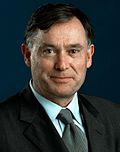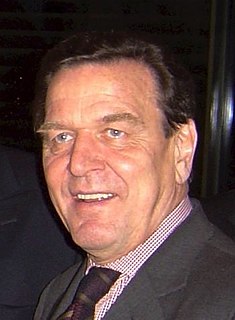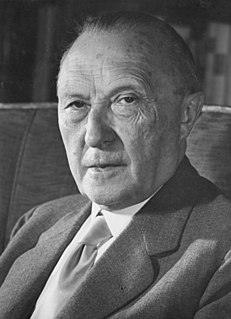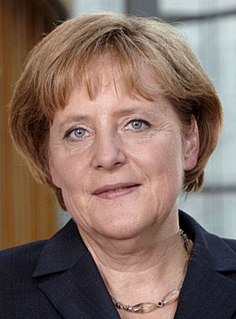This article does not cite any sources .(December 2009) (Learn how and when to remove this template message) |
| |||||||||||||||||
| |||||||||||||||||
| |||||||||||||||||
The President of Germany (Bundespräsident) is the titular head of state of the Federal Republic of Germany. The president's tasks are mostly ceremonial, but for the signing of all new federal laws before they go into effect. In practice however, all presidents have had informal influence on politics and society but mostly in a non-partisan way.
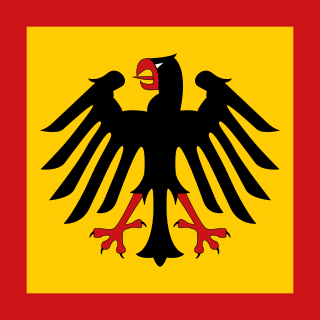
The President of Germany, officially the Federal President of the Federal Republic of Germany, is the head of state of Germany.

Germany, officially the Federal Republic of Germany, is a country in Central and Western Europe, lying between the Baltic and North Seas to the north, and the Alps to the south. It borders Denmark to the north, Poland and the Czech Republic to the east, Austria and Switzerland to the south, France to the southwest, and Luxembourg, Belgium and the Netherlands to the west.
The president is not elected directly by the voters but by a special Federal Convention (Bundesversammlung) which is assembled every five years for this task alone. This body consists of the members of the Bundestag and an equal number of members selected by the sixteen federal state parliaments.

The Bundestag is the German federal parliament. It can be compared to the chamber of deputies along the lines of the United States House of Representatives or the House of Commons of the United Kingdom. Through the Bundesrat, a separate institution, the individual states of Germany participate in legislation similar to a second house in a bicameral parliament.

Germany is a federal republic consisting of sixteen states. Since today's Germany was formed from an earlier collection of several states, it has a federal constitution, and the constituent states retain a measure of sovereignty. With an emphasis on geographical conditions, Berlin and Hamburg are frequently called Stadtstaaten (city-states), as is the Free Hanseatic City of Bremen, which in fact includes the cities of Bremen and Bremerhaven. The remaining 13 states are called Flächenländer.
The election date was at the time set on 23 May every five years in the national capital Berlin. 23 May is the date the German Grundgesetz was accepted in 1949, but the date will be changed when a President leaves office before the completion of their term (as has happened before). Of the 1,206 members only 549 belonged to the parties that controlled the federal government - the Social Democrats (SPD)) and the German Green Party. Also in their camp were the 31 members of the Party of Democratic Socialism (PDS). The opposition parties, the (Christian Democratic Union/Christian Social Union (CDU/CSU) and Free Democratic Party (FDP), however, had a majority of 624 members because they commanded more seats in the federal states. One member belonged to a regional party; one was non-aligned.
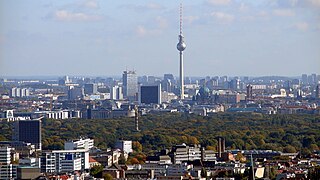
Berlin is the capital and largest city of Germany by both area and population. Its 3,748,148 (2018) inhabitants make it the second most populous city proper of the European Union after London. The city is one of Germany's 16 federal states. It is surrounded by the state of Brandenburg, and contiguous with its capital, Potsdam. The two cities are at the center of the Berlin-Brandenburg capital region, which is, with about six million inhabitants and an area of more than 30,000 km², Germany's third-largest metropolitan region after the Rhine-Ruhr and Rhine-Main regions.

The Social Democratic Party of Germany is a social-democratic political party in Germany.

The Party of Democratic Socialism was a democratic socialist political party in Germany active between 1989 and 2007. It was the legal successor to the Socialist Unity Party of Germany (SED), which ruled the German Democratic Republic as a one-party state until 1990. From 1990 through to 2005, the PDS had been seen as the left-wing "party of the East". While it achieved minimal support in western Germany, it regularly won 15% to 25% of the vote in the eastern new states of Germany, entering coalition governments in the federal states of Mecklenburg-Vorpommern and Berlin.
Each camp nominated a candidate for the job, although the outcome of the election is very predictable because the members of the convention normally vote with strict party loyalty. As the majority of the opposition was not overwhelming (624 of 604 needed), "dissident" members could cause a surprise.
The CDU/CSU and FDP nominated Horst Köhler. He was head of the International Monetary Fund in Washington, D.C., and before that, in the eighties and nineties, he was a senior official and was involved in negotiating both the German reunification treaty and the Maastricht Treaty on behalf of the German government. He is said to be rather modest but independently minded.

Horst Köhler is a German politician of the Christian Democratic Union, and served as President of Germany from 2004 to 2010. As the candidate of the two Christian Democratic sister parties, the CDU and the CSU, and the liberal FDP, Köhler was elected to his first five-year term by the Federal Assembly on 23 May 2004 and was subsequently inaugurated on 1 July 2004. He was reelected to a second term on 23 May 2009. Just a year later, on 31 May 2010, he resigned from his office in a controversy over his comment on the role of the German Bundeswehr in light of a visit to the troops in Afghanistan. During his tenure as German President, whose office is mostly concerned with ceremonial matters, Köhler was a highly popular politician, with approval rates above those of both chancellor Gerhard Schröder and later chancellor Angela Merkel.
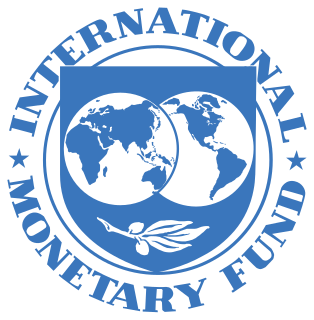
The International Monetary Fund (IMF) is an international organization headquartered in Washington, D.C., consisting of "189 countries working to foster global monetary cooperation, secure financial stability, facilitate international trade, promote high employment and sustainable economic growth, and reduce poverty around the world." Formed in 1944 at the Bretton Woods Conference primarily by the ideas of Harry Dexter White and John Maynard Keynes, it came into formal existence in 1945 with 29 member countries and the goal of reconstructing the international payment system. It now plays a central role in the management of balance of payments difficulties and international financial crises. Countries contribute funds to a pool through a quota system from which countries experiencing balance of payments problems can borrow money. As of 2016, the fund had SDR477 billion.

Washington, D.C., formally the District of Columbia and commonly referred to as Washington or D.C., is the capital of the United States. Founded after the American Revolution as the seat of government of the newly independent country, Washington was named after George Washington, first President of the United States and Founding Father. As the seat of the United States federal government and several international organizations, Washington is an important world political capital. The city is also one of the most visited cities in the world, with more than 20 million tourists annually.
The SPD and Greens had nominated Gesine Schwan, currently head of the Viadrina European University in Frankfurt (Oder). She is a renowned political scientist who also has been active for a long time in politics for the SPD - but has not always been in line with the party.

Gesine Schwan is a German political science professor and member of the Social Democratic Party of Germany. The party has nominated her twice as a candidate for the federal presidential elections. On 23 May 2004, she was defeated by the Christian Democrat and former president Horst Köhler. On 23 May 2009, both competed again for this position and Horst Köhler won his second term.
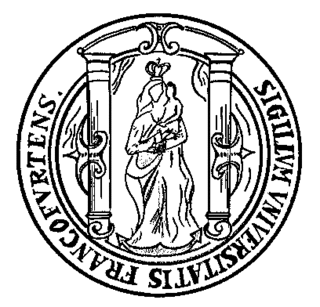
Viadrina European University is a university located at Frankfurt (Oder) in Brandenburg, Germany. It is also known as the University of Frankfurt (Oder). The city is on the Oder River, which marks the border between Germany and Poland. With 5,200 students — around 1,000 of whom come from Poland — and some 160 teaching staff, the Viadrina is one of Germany's smallest universities.

Frankfurt (Oder) is a town in Brandenburg, Germany, located on the west side of the Oder River, on the Germany-Poland border, about 80 kilometres (50 mi) east of Berlin. Until the end of Second World War (1945), the city of Słubice, Poland, was a part of Frankfurt. Until 1990 Frankfurt an der Oder was part of East Germany.
Since 1949, all eight presidents have been men, six members of the CDU or FDP, and two members of the SPD. Once in office, the President can be subsequently re-elected only once. The previous president Johannes Rau (SPD) cited personal reasons for his decision not to run for a second term. Rau died in 2006.

Johannes Rau was a German politician of the SPD. He was President of Germany from 1 July 1999 until 30 June 2004, Minister President of North Rhine-Westphalia from 20 September 1978 to 9 June 1998 and President of the Bundesrat from 1 November 1982 to 31 October 1983 and from 1 November 1994 to 31 October 1995.
Köhler won in the first voting round, receiving an immediate absolute majority of 604 (50.1%). Schwan won 589 votes, apparently attracting opposition voters.
| Round | Candidate | Votes | % | Party |
|---|---|---|---|---|
| First round | Horst Köhler | 604 | 50.1% | CDU |
| Gesine Schwan | 589 | 48.9% | SPD |
